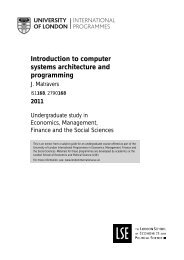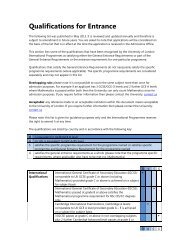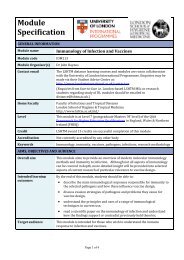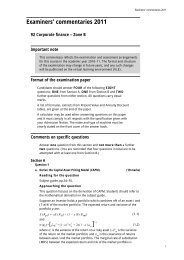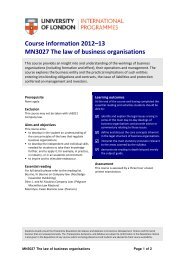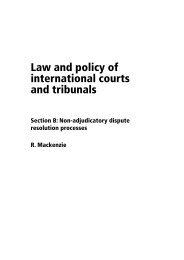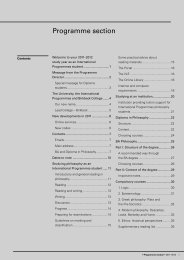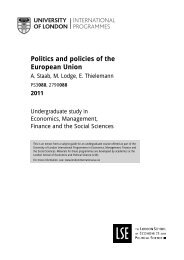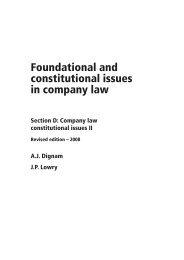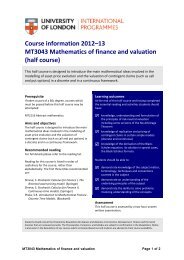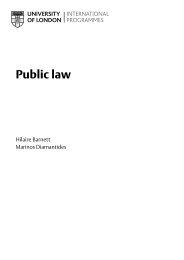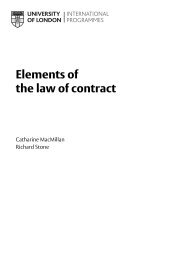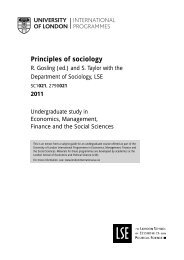2013–2014 Clinical Trials Epidemiology Global Health Policy ...
2013–2014 Clinical Trials Epidemiology Global Health Policy ...
2013–2014 Clinical Trials Epidemiology Global Health Policy ...
Create successful ePaper yourself
Turn your PDF publications into a flip-book with our unique Google optimized e-Paper software.
Infectious Diseases<br />
A welcome from Sara Atkinson (Course Director),<br />
Patricia Gorak-Stolinska (Deputy Course Director) and Jackie Cliff (Course Content Director)<br />
Sara Atkinson Patricia<br />
Gorak-Stolinska<br />
These courses are aimed both at recent graduates<br />
who wish to pursue an advanced degree, and at<br />
people who took their rst training some time ago<br />
and wish to update their knowledge in this rapidly<br />
evolving eld or who wish to change career direction.<br />
The study of Infectious Diseases will give students<br />
a comprehensive understanding of the biology<br />
of infective agents and host on the outcome<br />
of infection, and the use of this knowledge in<br />
combination with epidemiological and public<br />
health approaches to develop rational strategies<br />
for the control and treatment of infection.<br />
The Infectious Diseases courses<br />
draw upon the School’s long<br />
tradition in the study of clinical<br />
and epidemiological aspects of<br />
infectious and tropical diseases.<br />
Providing a broad understanding<br />
of infectious diseases, together<br />
with developing strategies for their<br />
control and treatment, the courses<br />
will be of particular relevance to<br />
in-service health professionals,<br />
such as doctors or laboratory sta<br />
who either wish to acquire new<br />
knowledge in infectious diseases<br />
For whom are the courses relevant? Entrance requirements<br />
Course objectives<br />
16 Postgraduate study in health<br />
Jackie Cliff<br />
All applicants are<br />
required to have:<br />
A second class honours degree or<br />
the equivalent, from a university or<br />
other institution acceptable to the<br />
University of London, in a scienti c<br />
subject (e.g. biology, medicine,<br />
nursing, dentistry, veterinary<br />
science, pharmacy) or in another<br />
scienti c discipline which has, in the<br />
opinion of the University, included<br />
suitable preliminary training.<br />
Applicants with an appropriate<br />
technical quali cation and work<br />
experience will be considered.<br />
All applicants must have an<br />
advanced level of ability to work in<br />
English. Applicants may be required<br />
to pass or to have passed within the<br />
last three years, at the appropriate<br />
level, a test of pro ciency in English<br />
acceptable to the University:<br />
or update their current expertise.<br />
In addition to compulsory core<br />
modules and a wide range of<br />
elective modules which allow for<br />
specialisation, it is also possible for<br />
students to carry out an individual<br />
research project in an area of their<br />
own choice. Many of the sta<br />
involved in the course work closely<br />
with international aid agencies<br />
and have extensive experience of,<br />
and contact with, low and middle<br />
income countries where infectious<br />
diseases are most prevalent.<br />
The Princeton Test of English as<br />
a Foreign Language (TOEFL)<br />
– Paper-based Test: a minimum<br />
overall score of at 600 and<br />
a minimum of 5.0 in the<br />
test of written English.<br />
– Computer-based Test: a<br />
minimum overall score of at<br />
least 250 and a minimum of 5.0<br />
in the test of written English.<br />
– Internet-based Test: a minimum<br />
overall score of at least 100<br />
and a minimum of 5.0 in the<br />
test of written English.<br />
The British Council Test (IELTS)<br />
A minimum overall score of<br />
7.0 and a minimum of 7.0 in<br />
the written component.<br />
Please note: It is is essential that all students<br />
have regular access to the internet (at<br />
least once a week) to participate in webbased<br />
discussions, access online library<br />
resources and submit assignments.<br />
Students must have a computer (see page<br />
9 for specifi cations) and are responsible for<br />
ensuring adequate system maintenance.<br />
Students will also require a calculator.



